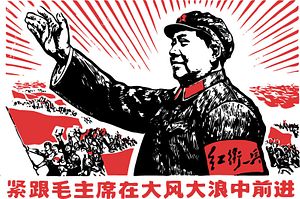The People’s Republic of China is run by people who like to celebrate anniversaries. The marking of the centenary of the foundation of the Communist Party in 2021–despite not happening for another five years–in some senses has already started, enshrined in the centennial goals that Xi Jinping and his colleagues have been heralding for the last year or so. Anniversaries for the start of reform (40 years in 2018), the 40th anniversary of the death of Mao Zedong (September this year), and a dozen other large and small things litter the calendar of leaders, taking up a surprising amount of their time through attendance at commemorative events.
This proclivity to hold a large event to mark important occasions means the likely universal silence in China around the moment in mid-May when most agree the Great Proletarian Cultural Revolution was formally launched half a century ago is all the more striking. The largest of all the mass campaigns inspired by Mao Zedong, it was, in his own words, his greatest achievement after leading the Communists to victory against the Japanese and the KMT. Mao even suggested close to his death that Cultural Revolutions needed to occur continuously, and be repeated every few decades or so. How can China’s leaders say, as they often do, that they regard Mao as a great leader, and yet not acknowledge an event he himself saw as a core part of his historic legacy?
On a personal level, too, the ten year campaign to, in the words of Mao’s wife, the radical Jiang Qing, “touch the soul” and “put politics in charge” did have a huge impact on the lives of any Chinese leader over 60 today. Xi himself was famously rusticated then, as were Wang Qishan and Liu Yunshan. Yu Zhengsheng, also in the Politburo, may well have lost family relatives because of his father’s very unfortunate romantic link, years before, to Jiang Qing. Despite this, Xi has only refereed fleetingly to the movement. It is almost as though there was a desire, to steal the phraseology so deeply favored at the time, to “consign it to the dustbin of history.”
The recently published translation of Sanskrit scholar Ji Xianlin’s memoirs over the Cultural Revolution period helps perhaps explain some of the leadership’s reluctance to dwell too much on the events of the late 1960s. The Cowshed describes Ji’s fate when he crossed swords with radicals at Peking University. It is a terse account, which makes the descriptions of struggle sessions endured by targets of the campaign all the more effective. Even the rats in the makeshift prisons housing those deemed class enemies grew emboldened against the Cultural Revolution victims, brazenly stealing their food. “Perhaps even the rats had realized that the building was inhabited not by ordinary human beings but by blackguards whom they could bully if they felt like it,” Ji acidly remarks.
The Cultural Revolution fascinates outsiders even today, probably because its grim theater and dynamics were so unique. Stalin had brutal show trials, and other dictators had vicious purges. But a movement seemingly passionately prosecuted by so many millions of people is hard to find external parallels to. It seems more like mass hysteria than a mass movement, but one which had very distinctive Chinese cultural characteristics and coordinates. Mao may well have wanted to promote revolutionary struggle abroad at the time, but even the Soviet Union and other Communist counties looked on with bewilderment at what was happening in China, so sui generis did it seem.
That might well best explain the silence today as the 50-year anniversary of the Cultural Revolution’s start draws near. Chinese leaders have been able to blame the outside world for most of their ills in the last few decades. The imperialists, Japanese, Americans, and then, in the late 1950s, the Soviets all figured as bullies, harming China and creating problems within it. The Great Leap Forward from 1957 was provoked by Soviet betrayal, as were the famines that followed it. The 1989 uprising was due to international, U.S.-led provocations and a desire for containment. The outside world has often had a prime position when it comes to establishing who is most at fault for problems within China.
There are times when this might have been true. No one would dispute the harm that imperialism and then Japanese aggression did to China. But with the Cultural Revolution, acknowledged even by the Communist Party itself in its famous historic resolution in 1981 as a major catastrophe, China has a disaster that it visited on itself, with no one else to blame. This makes it more than simply a bad event; it means that in Chinese national psychology it was also a colossal loss of face, an embarrassment, something that China and China alone has to face up to.
Chinese leaders of today are silent not primarily so much because they are dismissive of the Cultural Revolution and what it meant – nor because they are angry or bitter about it. Their likeliest attitude is that, as an indigenous and hugely popular movement at the time, it is a massive embarrassment, and one that caused China immense loss of face. For that reason, more than any other, they would simply like the world inside and outside China to forget. Thankfully, memoirs like that of Ji Xianlin and others mean they are unlikely to succeed. The Cultural Revolution was a big part of modern Chinese history; however complex and inconvenient, its reality — and what it showed about Chinese people, society, and politics — needs to be studied and observed.

































